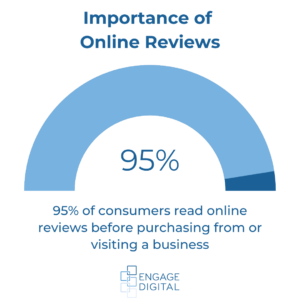As a business owner, you know that word-of-mouth recommendations can make or break your success. In today’s digital age, that recommendation often comes in the form of online reviews. As a result, online reviews are a crucial component of building a positive reputation for businesses in today’s digital landscape.
The Importance of Online Reviews
 Online reviews are essential for any business that wants to be successful. According to a survey, 95% of consumers read online reviews before purchasing from or visiting a business. In addition, 84% of consumers trust online reviews as much as personal recommendations. These statistics alone should convince you that online reviews are essential for your business.
Online reviews are essential for any business that wants to be successful. According to a survey, 95% of consumers read online reviews before purchasing from or visiting a business. In addition, 84% of consumers trust online reviews as much as personal recommendations. These statistics alone should convince you that online reviews are essential for your business.
Positive reviews can attract new customers, while negative reviews can turn them away. Managing your online reputation through active review management and responding to reviews can demonstrate a commitment to customer satisfaction and build trust with potential customers. With the increasing importance of online presence, businesses can’t afford to ignore the impact of reviews on their reputation and bottom line.
Google vs. Yelp
The two most popular review sites are Google and Yelp. If you are an iPhone user that frequently looks up stores and restaurants, you probably heavily favor Yelp reviews as a consumer, as you are used to seeing Yelp reviews and photos from Yelp reviews when you search for a business. If you’re an Android user using your phone to look up local businesses, you likely rely more on Google reviews. And, if you are a desktop user looking up businesses, you will first see Google reviews.
But, which review site are your customers utilizing the most? Let’s look at both digital review platforms, and see which one might be best for your business:
Yelp Business Reviews
Yelp is a review site that allows users to leave reviews and ratings for local businesses. More than 145 million people visit Yelp each month, and 70% of those come from mobile. In total, Yelp has over 250 million reviews. A recent 2020 study found that approximately 45% of online shoppers used Yelp to review their purchases before making a purchase. Yelp reviews can significantly impact a business’s reputation, as many consumers turn to Yelp when looking for a new restaurant, hair salon, or other local business.
One of the biggest advantages of Yelp is its user base. Yelp has a loyal following of users who actively seek out and leave reviews. This means that businesses with positive reviews on Yelp are more likely to attract customers who are already inclined to leave positive reviews themselves. This creates a positive feedback loop that can lead to even more positive reviews and increased visibility on the platform.
Another advantage of Yelp is its robust search functionality. Yelp allows users to search for businesses by category, location, price range, and other criteria. This makes it easy for users to find businesses that meet their needs. Yelp also offers features like check-ins, bookmarks, and user photos, which can help businesses attract more attention and engagement on the platform.
Perhaps the most significant benefit to Yelp is that Apple relies on and utilizes Yelp information, reviews, and photos for their business listings. When an iPhone user searches on Apple Maps for a business, they will see the Yelp rating, photos from Yelp, and other information from Yelp. If you’re a business-to-consumer service business, especially if your business is a retail business, you will want to focus on Yelp reviews.
Google Business Reviews
Google is the most popular search engine in the world, with over 8.5 billion searches per day. When someone searches for your business on Google, they will likely see your Google My Business (GMB) listing. This listing includes your business’s name, address, phone number, website, hours of operation, and reviews. Having a positive rating on Google can be the deciding factor for someone trying to decide whether to visit your business.
Google reviews also play a significant role in local SEO. When someone searches for a business on Google, the search engine will display a map with three local listings. This is called the local pack. Various factors, including the number of reviews and average rating, determine the local pack’s businesses. The more positive reviews your business has, the higher it will rank in the local pack.
Another advantage of Google is its integration with other Google services. For example, when someone searches for a business on Google Maps, they will see the business’s reviews and ratings in the search results. Google also offers features like Google Posts and Google Q&A, which can help businesses attract more attention and engagement on the platform. If your business is a Business-to-Business (B2B), you’ll want to focus on Google reviews.
Which is Better for Businesses: Yelp or Google?
So, which review site is better for businesses? The answer is…it depends.
If you run a restaurant, hair salon, or other consumer-facing business, Yelp may be the better choice. Yelp has a loyal following of users who actively seek out and leave reviews, which can help businesses attract more positive reviews and visibility on the platform. Yelp also offers robust search functionality and features like check-ins and user photos, which can help businesses attract more attention and engagement on the platform.
On the other hand, if you run a business that relies on local search traffic, Google may be the better choice. Google is the most popular search engine in the world, and having a positive rating on Google can be the deciding factor for someone trying to decide whether to visit your business. Google also offers integration with other Google services like Google Maps, which can help businesses attract more attention and engagement on the platform.
Ultimately, the best approach is to have a presence on Yelp and Google. By having a presence on both platforms, you can reach a wider audience and increase your chances of attracting new customers. Then, in addition to Google and Yelp reviews, you may want to spend some time on Facebook reviews (if you’re active on Facebook) and one or two other review sites that might be more specific to your industry. These altenrative sites are platforms such as TrustPilot, ConsumerReports, Angi, Better Business Bureau or HomeAdvisor. However, we caution you not to spread yourself too thin. It is better to have a large amount of reviews on 2-3 review platforms than it is to have only a few on 5+ platforms.
Here are some tips for managing your online reviews on Yelp and Google:
Managing Yelp Reviews
- Claim your Yelp listing: If you haven’t already, claim your Yelp listing and ensure all your business information is accurate and up-to-date.
- Respond to reviews: Respond to both positive and negative reviews professionally and courteously. This shows that you care about your customers and are committed to resolving any issues.
- Encourage customers to leave reviews: Encourage your customers to leave reviews on Yelp by adding a Yelp badge to your website, displaying signage in your business, or including a link to your Yelp page in your email signature.
Managing Google Reviews
- Claim your Google My Business listing: If you haven’t already, claim your Google My Business listing and ensure all your business information is accurate and up-to-date.
- Respond to reviews: Respond to both positive and negative reviews in a professional and courteous manner. This shows that you care about your customers and are committed to resolving any issues. Seek to take
- Encourage customers to leave reviews: Encourage your customers to leave reviews on Google by including a link to your Google My Business listing in your email signature, displaying signage in your business, or asking for reviews in person.
And, one additional tip for both Google and Yelp reviews is not to panic if you get a negative review. Negative reviews will happen no matter how smoothly your business operates and how much you prioritize the customer experience. But, if you’re doing right by your customers, new positive reviews will quickly push negative reviews down and raise your business rating back up. In addition, having a few non 5-star reviews will actually help, as having all 5-star reviews is often a red flag to consumers.
In the end, we can’t answer which is better. The battle of Yelp vs. Google continues. Both Yelp and Google offer unique advantages for businesses looking to build and maintain a positive online reputation. Yelp has a loyal following of users who actively seek out and leave reviews, while Google is the most popular search engine in the world and plays a significant role in local SEO. Ultimately, the best approach is to have a presence on both platforms and actively manage your online reviews. Doing so can increase your visibility, attract new customers, and build a solid online reputation for your business.






